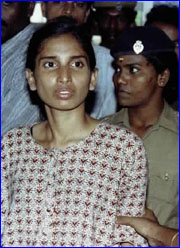Amnesty concerned over Indian convictions
[TamilNet, Sunday, 01 February 1998, 23:59 GMT]
Amnesty International said that it "is concerned that 26 people sentenced to death by a special court in the southern Indian state of Tamil Nadu on 28 January 1998 may not have received a fair trial according to international standards for fair trial", in a statement released by the London based human rights organisation last thursday.
Amnesty said that the legislation used to convict the 26 people "contravenes several international standards for fair trial, including the holding of trials in camera and the non-disclosure of the identity of witnesses.".
"Although the majority of those accused were arrested in July 1991, a charge sheet was not drawn up until May 1992 and a preliminary trial did not begin until May 1993. The trial itself took place in January 1994" said Amnesty.
Last Wednesday, an Indian court sentenced 24 people, including nine Indian nationals to death after finding them guilty of conspiracy to murder Mr. Rajiv Gandhi, the former Prime Minister of India. Another two Indian nationals were found guilty of the murder.

Mr. Rajiv Gandhi was killed in a bomb explosion in May 1991, at an election rally in Tamil Nadu. The Indian authorities blamed the Liberation Tigers for the attack, though the LTTE has denied any involvement.
The Indian authorities arrested several people, mostly in July 1991, and charged them with involvement in the attack. The charges were filed under the Terrorist and Disruptive Activities (Prevention) Act (TADA).
The Indian authorities withdrew the TADA legislation in 1995, following criticism from human rights organisations, but the trials of those accused under it have continued.
 |
Nalini, one of the 26 accused for the assassination of former Indian prime minister Rajiv Gandhi, is seen in this file picture June 15, 1991 at a special court in a suburb of the southern city of Madras.
Photo by Kamal Kishore REUTERS |
Amnesty noted that the trial took place in the Poonamallee jail in Madras which was "designated a special court under TADA, where many of those sentenced had been detained for almost seven years since arrest".
Amnesty said that it "unconditionally opposed to the use of the death penalty in all cases, as a violation of the right to life and the right not to be subjected to cruel, inhuman or degrading treatment or punishment".
Amensty said it was also concerned that "the judge involved indicated the sentences were handed down for deterrent purposes", noting that "the death penalty has never been shown to have a special deterrent effect.".
The lawyers defending the accused have said they will appeal to the Indian Supreme Court.
Amnesty noted that under TADA regulations, it was not possble to apply to the Indian High Court before moving to the Supreme Court, unlike under normal Indian law.
Commenting on one of the accused, Ms.A. Athirai, who was 17 years old at the time of her arrest in July 1991, Amnesty international conventions state that sentence of death should not be imposed for crimes committed by persons below eighteen years of age.
Article 6(5) of the International Covenant on Civil and Political Rights (ICCPR) and Article 37(a) of the Convention on the Rights of the Child were cited by Amnesty.
Amnesty appealed for members of the public to express concern over the death sentences and that the trials may not have been fair, in communications to the Indian President, Chief Justice and Minister for Home Affairs, as well as to Indian diplomatic missions.











 Mr. Rajiv Gandhi was killed in a bomb explosion in May 1991, at an election rally in Tamil Nadu. The Indian authorities blamed the Liberation Tigers for the attack, though the LTTE has denied any involvement.
Mr. Rajiv Gandhi was killed in a bomb explosion in May 1991, at an election rally in Tamil Nadu. The Indian authorities blamed the Liberation Tigers for the attack, though the LTTE has denied any involvement.